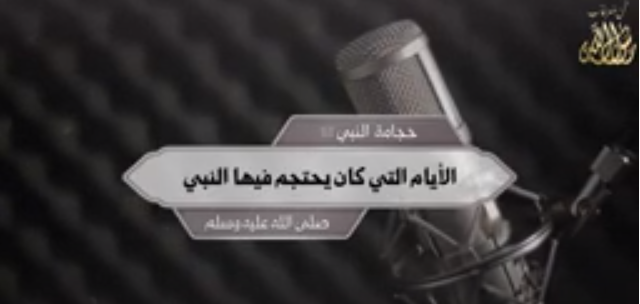In which we have cited many sections dealing with Mohammed (pbuh) in various positions in a very simplified manner. Each section is divided in two parts; the first part is entitled from the sayings of Muhammed (pbuh) and the other is entitled from his actions. This we've done in order to make you compare his words with his deeds, and we might be adding some simple comments to focus on the essence of some of his sayings( Hadith) or for more explaining of meanings.
Introduction
Introduction:
In the name of Allah, the most-merciful, the most-gracious and peace be upon Allah's Messenger
Why this book:
Muhammed (pbuh) came more than 1400 years ago and said that he is receiving divine revelation from the almighty Allah and that he is assigned to spread this message throughout all earth, unrestricted by time, place, race or color claiming that his message is the last between heaven and earth and that he is the last of Allah's messengers and Prophets.
Who is he? is he that terrorist that newspapers are circulating pictures of? or is he the organized military man who was victorious in almost every battle he joined against his enemies?
Some books that dealt with Mohammad (pbuh) had talked about the person who, through the course of 25 years only which is the period of his da'wa (the call), was able to change the face of the earth and his call spread everywhere, such books dealt with his political and military genius. Other books dealt with the military or jihad side of his life in defense of his call. Most of the books have overlooked a very important aspect of his life (pbuh), which is his being a human, a father, a brother and a husband.
Muslims believe that what took place in Muhammed’s (pbuh) life regarding the aspects of social relations is not something that he invented, but that is part of the divine revelation. this is the reason why we have focused on this invisible or suppressed aspect of his life (pbuh). Muhammed (pbuh) when he first started his message (call) he did not fight against his folk, on the contrary he and his companions were patient and they have suffered great adversity from them. During such hard times, Allah's Messenger (pbuh) was raising his companions on such manners that made them become kings and leaders in spite of having no interest in such wealth.
The reason behind showing the life of Muhammed (pbuh) in this way as represented is because of all what is said about him (pbuh) from those who don't really know him.
So let us be objective; if you want to judge someone you have to do the following:
1) Hear from him personally.
2) Review his thought with sound logic.
3) If you approve of his logic, then see if his actions go in line with such logic.
4) If that happened, then all you have to do is to believe him. that is what Allah's Messenger (pbuh) said "obligation is dependant on the mind"……so whoever is mindless has no obligatIion.
These are four logical steps which you are supposed to use to judge Muhammed (pbuh). All you have to do is read the following few papers with an objective unbiased mind and finally you would be able to answer these confusing questions
· Is Muhammed (pbuh) truly a terrorist?
· Iis he really a Prophet as he used to claim?
· is Islam a true religion?
This book is divided into two chapters
Chapter one: fundamental definitions:
In order to read and understand everything about Muhammed (pbuh), we had to find common grounds to start from, so we have dedicated this chapter to show fundamental definitions & meanings related to our subject like: the religion, the Messenger, Allah, and Islam. To start with such definitions is very important to understand the essence of this book.
Chapter two: Excerpts from Allah's Messenger (pbuh) sayings & actions:
Related Articles
Various of subjects and articles

